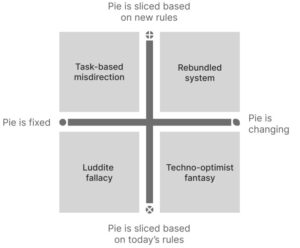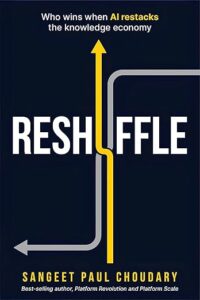People often take two extreme views on AI. They’ll either quote Jevons Paradox and feel smart about it or predict doomsday scenarios. There’s a problem with this polarized debate – both sides are locked in a tug-of-war over whether the pie grows or shrinks while missing what’s really happening:
AI grows the pie, but the growing pie isn’t sliced in a way that everyone gets their fair share.
When technology shifts, it doesn’t merely add value; it also reorders the balance of power.
We tend to treat economic growth and inequality as separate issues, as if one belongs to macroeconomics and the other to ethics. But they’re deeply intertwined.
A growing system does not mean shared prosperity.
In fact, growth and inequality often rise together, because the very mechanisms that expand the pie also determine how it’s divided.
Today’s polarized debate frames the problem in terms of job loss or productivity gains, but overlooks how AI changes how systems are restructured and who has control over them.
To clarify this, we need to consider four distinct positions based on how the pie grows and how it’s sliced.
The Luddite fallacy of machines taking over jobs in a fixed system sits at the bottom-left. It’s a fear that’s easy to mock in hindsight, but it persists because even with system shifts, people do lose out.
The techno-optimist fantasy proposes that innovation will expand the pie for everyone. The myth that AI will only make the world a better place for all is hyped incessantly by startups selling a vision of future productivity., while ignoring evidence of wage stagnation and growing inequality.
In the top-left quadrant, we find task-based misdirection. People sense that work is changing, but still treat the pie as fixed. In this, humans supervise AI while it executes at scale, but the architecture of value creation stays the same. Comforting but illusory.

This brings us to what’s really happening: the pie is growing, but not everyone will benefit from the gains. This is the quadrant of rebundling, where entire industries are being rebuilt around new logic.
All three other quadrants still run with the task-centric framing. Only in this quadrant is AI seen as the engine for a new system.
Success is no longer determined by getting better at playing yesterday’s game using AI, but by whether you’re playing the right game.
Former giants collapse, not because they didn’t adopt the tools, but because they adopted them into old systems.
Kodak went digital, and Barnes and Noble had a website and an e-reader. In the end, it didn’t really matter.
Most debates about AI are in the bottom half: Will jobs vanish? Will productivity rise? The real question is up and to the right: Who defines the new rules? Who captures the upside?
This is the fundamental idea of a reshuffle. New winners and losers emerge, not despite a growing pie, but precisely because of it.
—
All this and more is unpacked in my new book out now on Amazon.
Article by channel:
Everything you need to know about Digital Transformation
The best articles, news and events direct to your inbox
Read more articles tagged: AI, Future of Work







